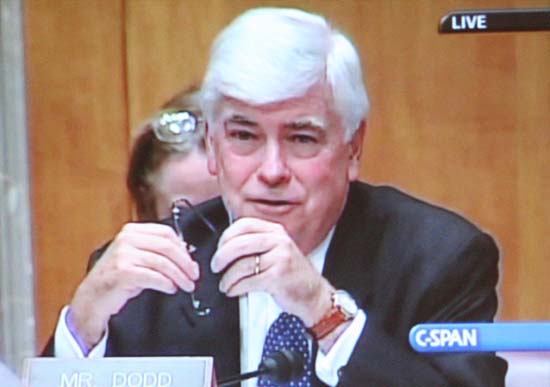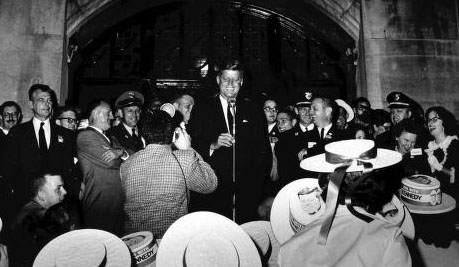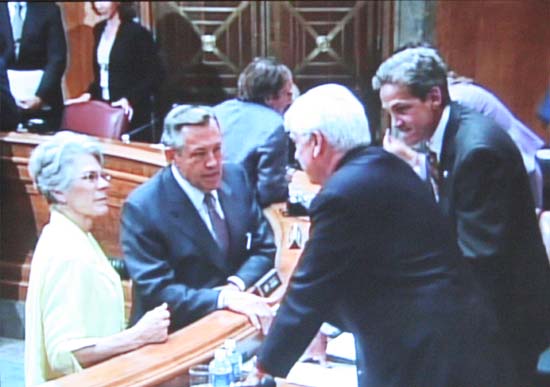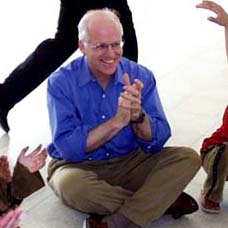2006.09.14: September 14, 2006: Headlines: Figures: COS - Dominican Republic: Politics: Congress: Election2008 - Dodd: Presidents - Kennedy: History: Speaking Out: US Senate: Senator Chris Dodd's Vision for the Future of Peace Corps
Peace Corps Online:
Directory:
Dominican Republic:
RPCV Chris Dodd (Dominican Republic) :
RPCV Chris Dodd: Archived Stories:
2006.09.14: September 14, 2006: Headlines: Figures: COS - Dominican Republic: Politics: Congress: Election2008 - Dodd: Presidents - Kennedy: History: Speaking Out: US Senate: Senator Chris Dodd's Vision for the Future of Peace Corps
 | Dodd's Vision for the Peace Corps
Senator Chris Dodd (RPCV Dominican Republic) spoke at the ceremony for this year's Shriver Award and elaborated on issues he raised at Ron Tschetter's hearings. Dodd plans to introduce legislation that may include: setting aside a portion of Peace Corps' budget as seed money for demonstration projects and third goal activities (after adjusting the annual budget upward to accommodate the added expense), more volunteer input into Peace Corps operations, removing medical, healthcare and tax impediments that discourage older volunteers, providing more transparency in the medical screening and appeals process, a more comprehensive health safety net for recently-returned volunteers, and authorizing volunteers to accept, under certain circumstances, private donations to support their development projects. He plans to circulate draft legislation for review to members of the Peace Corps community and welcomes RPCV comments. |
Senator Chris Dodd's Vision for the Future of Peace Corps

Senator Chris Dodd (RPCV Dominican Republic) spoke at the ceremony for this year's Shriver Awards and elaborated on issues he raised at Ron Tschetter's hearings. Dodd plans to introduce legislation that may include: setting aside a portion of Peace Corps' budget as seed money for demonstration projects and third goal activities (after adjusting the annual budget upward to accommodate the added expense), more volunteer input into Peace Corps operations, removing medical, healthcare and tax impediments that discourage older volunteers, providing more transparency in the medical screening and appeals process, a more comprehensive health safety net for recently-returned volunteers, and authorizing volunteers to accept, under certain circumstances, private donations to support their development projects. He plans to circulate draft legislation for review to members of the Peace Corps community and welcomes RPCV comments.
Senator Chris Dodd's Vision for the Future of Peace Corps
Sen. Dodd Outlines Vision for Future of Peace Corps
September 14, 2006
Washington -- Senator Chris Dodd (D-CT), himself a former Peace Corps volunteer, today addressed the National Peace Corps Association's Capitol Hill Luncheon in honor of the Peace Corp's 45th anniversary. The following is the text of his prepared remarks:
Remarks By
Senator Christopher J. Dodd
National Peace Corps Association’s Capitol Hill Lunch
in Celebration of the Peace Corps’s 45th Anniversary
Thursday, September 14, 2006
In the summer of 1966, I was carrying a 30-pound backpack for five miles through the mountains of the Dominican Republic, and as the sweat ran down my face, my socks dissolved inside my boots, and several dozen large insects ate me alive, I remember thinking, very distinctly—“This’ll make a great introduction for my speech to the National Peace Corps Association!”
When President Kennedy created the Peace Corps in 1961, I was just 17 years old, and now the Corps is 45, and I’m……well……not very good at math. But what joy it gives me to celebrate almost half a century for the organization that molded my life and the lives of so many here. I want to recognize some of our friends who owe the whole shape of their lives to the Peace Corps: There’s Kevin Quigley, President of the NPCA, and Carrie Hessler-Radelet of the NPCA Board. I also want to recognize Barbara Ferris, co-founder of the Peace Corps Fund and currently President of the International Women’s Democracy Center. Earlier this year, Barbara ran for Congress from Ohio’s 10th District in the Democratic primary; and even though you didn’t win, Barbara, I hope you’ll stay engaged in politics—we need more returned volunteers in public life. Finally, my dear friend Carol Bellamy, who serves on the NPCA Advisory Council; and, of course, my dear friend and colleague, Senator Harris Wofford.
I don’t think I can add anything to Harris’s introduction of our Shriver Award winner, Loren Finnell, nor to Mr. Finnell’s own fine remarks—except to add how much we need more work like Mr. Finnell’s, which empowers the people of developing nations to mend their own world. That word, “empower,” gets thrown around so often these days we tend to forget what it means. It means, literally, that we take power out of the hands of ourselves, and people like us, and put it in the hands of the people who most need it. Doing that in earnest truly needs a humble heart.
Finally, I want to acknowledge Peace Corps volunteers Justin Brady and Matthew S. Costa, and returned volunteer Staff Sgt. Robert J. Paul, all of whom served more fully than has been asked of any of us here; who all, this month, died in the service of their country.
The organization we celebrate today owes its existence to two speeches given by John F. Kennedy during his 1960 presidential campaign. They are very much our founding documents, and today I want to look at them in some detail. First, because as I read President Kennedy’s words, you’re going to see me getting handsomer and handsomer, and more charismatic by the minute before your very eyes. And second, because they deserve to be looked at together, as a matched pair in which we see the two poles of our purpose.
In November of 1960, a week before the election, Kennedy spoke at an auditorium in San Francisco—and lest we get too boastful about our great Peace Corps, let’s remember that the Peace Corps was first officeally conceived in an address at the so-called “Cow Palace.” At any rate, JFK rose to speak with the goal of proving that he was the stronger candidate on national security, that his approach to defense and foreign policy would confront our enemies with greater nimbleness and superior strength.
This was key to the Peace Corps’s original context, and when we read his words, we find that the recurring concept isn’t “goodwill,” or “development,” or “service.” It’s—“the Russians.” I’ll quote a sampling of sentences:
* “Diplomats skilled in the languages and customs of the nation to whom they are accredited…are pouring forth from Moscow to advance the cause of world communism."
* “The Lenin Institute for Political Warfare exports each year hundreds of agents to disrupt free institutions in the uncommitted world.”
* “Already Asia has more Soviet than American technicians.”
* “I am convinced that our young men and women, dedicated to freedom, are fully capable of overcoming the efforts of Mr. Khrushchev’s missionaries who are dedicated to undermining that freedom.”
The truth is that Soviet communism was hovering over the birth of our Peace Corps like an evil spirit; and President Kennedy conceived the Corps, in part, as a weapon for the ideological struggle. Obviously not as a weapon of war—but JFK’s point was just that weapons of war would no longer suffice. In sending muscle and know-how to the Third World, in fighting to lift up the destitute, in a thousand painful acts, the Peace Corps was also doing America’s work: Our reputation thrives when the world sees our ideals not just in ink, but incarnate in the young man or woman with dirty hands who is working in the sun beside you.
So President Kennedy had the foresight to know that sometimes our virtues and our needs line up—that we can serve others and ourselves in one act. And he had the wisdom to see that there are more measurements for strength than caliber or tonnage or blast-radius.
Peace Corps enlistment spiked 23% after the attacks of 9/11, and I seriously doubt that any of our new volunteers were shipping off to fight the Red Menace. But JFK’s point still stands, and our new volunteers get it—the Peace Corps always was and will be a force for our interests. In this generation, it’s our unique challenge that our interests are so, so hard to put a finger or a label on. Who exactly are our enemies? Where are they hiding? Who can we fight, who can we convince, who can we serve to say with certainty that our war is getting won? The difficulty of these questions makes up our generation’s central test, and simple answers will only buy us failure.
But this much we can agree on: You can only hate America if you don’t know America. And in all the controversies of the past five years, all the vagaries of strategy and tactics and plan and counterplan, there’s one policy that guarantees success: sending our best young men and women into the world to make America known.
Never in our history has it been more critical that the Peace Corps succeed in its mission to “promote world peace and friendship.” As we all know, the Corps seeks to advance both a better understanding of Americans and better understanding by Americans; and those goals are especially central if we want to effectively counter the spread of terrorist ideology to disaffected people around the world, people who, after all, know as little of us as we know of them. So is the Peace Corps an instrument of policy? Absolutely it is.
But if I stopped here, I’d only have half a speech; and if we stopped here, we’d only have half a Corps. (A Peace Torso, perhaps?) To cynics, the Peace Corps is only an instrument of policy. They read the Kennedy speech and say, “Aha—a faux-idealistic campaign ploy! An empty tough-on-commies gesture!” Richard Nixon called the Peace Corps “a haven for draft-dodgers.” Even Dwight Eisenhower said it was “a juvenile experiment.” To others, the Corps was merely a convenient cloak for imperialism. I’ve read a 1961 article from the Red Flag, an official Communist Party newspaper, which accuses us of the following: The Peace Corps is “nothing but an organ of new colonialism, a sly trick in the pernicious juggling of diplomacy by remote control, a tool with which to subvert underdeveloped countries so that they might become puppets of America….We do not recognize all the rot about its humanitarianism.”
And you know what? If we stopped here, they might have half a point. But the Peace Corps didn’t stop here, and neither do we.

Caption: Well after midnight on October 14, presidential candidate John F. Kennedy arrived at the steps of the Michigan Union. In a short speech he outlined the idea of the Peace Corps, challenging students "to contribute part of your life to this country."
We go back to October of 1960, two weeks before San Francisco, and we remember that John Kennedy arrived at the University of Michigan in the dark and was surprised by a crowd of 10,000 waiting students, and that the Peace Corps was born at two in the morning. The San Francisco speech was anticipated weeks in advance, prepared by Ted Sorensen and a team of foreign policy experts; but no one planned for the speech in Ann Arbor. Our Peace Corps wasn’t even launched in a statement, but with a question: “How many of you who are going to be doctors, are willing to spend your days in Ghana? Technicians or engineers, how many of you are willing to work in the Foreign Service and spend your lives traveling around the world?” President Kennedy didn’t have an organization for this idea, he didn’t have funding—he didn’t even have a name for it! But this is exactly where we trace our origin, before bureaucracy, before executive orders, all the way back to the spontaneous and nameless need.
I don’t know exactly why the idea came to Kennedy on the steps of the Michigan Union; but if any of us should ever be lucky enough to have 10,000 young men and women waiting for hours to see us outdoors in the cold, I’d hope we could come up with something as meaningful.
So yes, the Peace Corps was a weapon in the Cold War, and yes, it remains a tool for the War on Terror; but if it was just that, there’s no way it would have drawn us back here today. As I said, there are two poles to its purpose. There are the purpose-full agents who show our strength and our virtue abroad. But there is also President Kennedy’s unscripted will to serve, his unplanned plan and the 30,000 letters to his campaign that answered it. The Peace Corps is both of these things, and because it is both, it is unique among our institutions.
And so many of us have come back today, I think, because the Peace Corps is something of an allegory for our own lives and our own selves—how difficult it is to reconcile the calculating side of our intelligence with the part that wants to roll up its sleeves and dig a well—but what great things we can achieve when we join the two. For almost half a century—and, we hope, another to come—the Peace Corps has been such a success because it has bridged this gap with such grace.
But does that make the Peace Corps an unadulterated success? Of course not—perfect successes only exist in propaganda and campaign commercials. Every chance I get I take the opportunity to speak with active and returned volunteers about what we can do to make the Peace Corps better, and they aren’t short on suggestions. Good! We should be proud to have so many volunteers who return from abroad with so many ideas.
I’ve taken the best of these ideas and worked to flesh them out into legislation, which I hope to bring to the floor of the Senate in the near future. But before I do that, I’ll of course circulate draft legislation for review to all interested members of the Peace Corps community, and I’ll welcome your comments. For now, here are some of the ideas I’m working on:
* We should set aside a portion of the annual Peace Corps budget as seed monies; the funds could go to active volunteers for demonstration projects at their sites and for returned volunteers interested in “third goal” projects at home. Of course, this would mean adjusting the annual budget upward to accommodate the added expense.
* We should authorize active volunteers to accept, under certain carefully defined circumstances, private donations to support their development projects.
* We should establish mechanisms for more volunteer input into Peace Corps operations, including staffing decisions, site selection, language training, and country programs.
* We can bring the Peace Corps into the digital age by establishing websites and email links for use by volunteers in-country.
* Let’s authorize active recruitment from the 185,000 returned Peace Corps volunteers for second tours and as third-goal educators here in the United States.
* We need to remove certain medical, healthcare and tax impediments that discourage older men and women from becoming volunteers.
* We need more transparency in the medical screening and appeals process.
* And finally, let’s provide a more comprehensive and user-friendly health safety net for recently-returned volunteers.
I’m glad to let you in on these plans in advance, because our respect for the Peace Corps makes a common bond. That’s why I want to ask all of you here today for help these ideas become law as soon a possible—along with other ideas that make sense—so we can celebrate them when we gather here again for our fiftieth anniversary.
Obviously these ideas mean I’ve come here in part to criticize the Peace Corps, because each arose out of volunteers’ specific criticism, and because every suggestion implies its fault—everything we ought to be doing is something we’re failing to do now. And it occurred to me that it might not be very polite to find fault with the Peace Corps when we’ve come here to praise it.

Caption: Senators Chris Dodd and Norm Coleman speak to Ron Tschetter after the Senate hearings for Tschetter's nomination to be Director of the Peace Corps.
But in the Peace Corps, I decided, criticism and praise are much the same thing. As a matter of fact, the Peace Corps is one sustained exercise in self-criticism, and that’s just its strength. For our young men and women, living and serving among poverty is an implicit censure of their relative wealth. Learning to serve and work with our hands is a self-criticism, because it confronts us with our weaknesses. And more: Sargent Shriver has said, in a phrase that ought to be embroidered here on our tablecloths, “Peace Corps Volunteers come home to the USA realizing that there are billions—yes, billions—of human beings not enraptured by our pretensions, or our practices, or even our standards of conduct.” So I realized that criticism is exactly what the Peace Corps wants, because its life is criticism. And we can’t honor it any better than taking the rigors it applied to each of us in our turn, and turning them back on the source.
I will continue to do so, and you shouldn’t expect any less. But for all that, there is so much more to say in praise for the role of the Peace Corps in our life and the life of the world these last 45 years. In the end, the best thing I can say is nothing. The Peace Corps has done its work for four-and-a-half decades in fields and villages around the world; but it’s also done its work in our selves, and some of that will always be inexpressible. Where we can’t express, we can at least remember—and I could do much worse than to leave you, not with any memory of mine, but with your own.
And when we’ve done our best to remember, let’s raise our glasses to John Kennedy’s plan in San Francisco and his inspiration in Ann Arbor, our Peace Corps, 45 years old and still new.
Thank you.
When this story was posted in September 2006, this was on the front page of PCOL:





Peace Corps Online The Independent News Forum serving Returned Peace Corps Volunteers
 | He served with honor
One year ago, Staff Sgt. Robert J. Paul (RPCV Kenya) carried on an ongoing dialog on this website on the military and the peace corps and his role as a member of a Civil Affairs Team in Iraq and Afghanistan. We have just received a report that Sargeant Paul has been killed by a car bomb in Kabul. Words cannot express our feeling of loss for this tremendous injury to the entire RPCV community. Most of us didn't know him personally but we knew him from his words. Our thoughts go out to his family and friends. He was one of ours and he served with honor. |
 | Chris Shays Shifts to Favor an Iraq Timetable
In a policy shift, RPCV Congressman Chris Shays, long a staunch advocate of the Bush administration's position in Iraq, is now proposing a timetable for a withdrawal of American troops. How Mr. Shays came to this change of heart is, he says, a matter of a newfound substantive belief that Iraqis need to be prodded into taking greater control of their own destiny under the country’s newly formed government. As Chairman of the House Government Reform subcommittee on national security, he plans to draft a timetable for a phased withdrawal and then push for its adoption. A conscientious objector during the Vietnam War who said that if drafted he would not serve, Chris Shays has made 14 trips to Iraq and was the first Congressman to enter the country after the war - against the wishes of the Department of Defense. |
 | Peace Corps' Screening and Medical Clearance
The purpose of Peace Corps' screening and medical clearance process is to ensure safe accommodation for applicants and minimize undue risk exposure for volunteers to allow PCVS to complete their service without compromising their entry health status. To further these goals, PCOL has obtained a copy of the Peace Corps Screening Guidelines Manual through the Freedom of Information Act (FOIA) and has posted it in the "Peace Corps Library." Applicants and Medical Professionals (especially those who have already served as volunteers) are urged to review the guidelines and leave their comments and suggestions. Then read the story of one RPCV's journey through medical screening and his suggestions for changes to the process. |
 | The Peace Corps is "fashionable" again
The LA Times says that "the Peace Corps is booming again and "It's hard to know exactly what's behind the resurgence." PCOL Comment: Since the founding of the Peace Corps 45 years ago, Americans have answered Kennedy's call: "Ask not what your country can do for you--ask what you can do for your country. My fellow citizens of the world: ask not what America will do for you, but what together we can do for the freedom of man." Over 182,000 have served. Another 200,000 have applied and been unable to serve because of lack of Congressional funding. The Peace Corps has never gone out of fashion. It's Congress that hasn't been keeping pace. |
 | Chris Dodd considers run for the White House
Senator Chris Dodd plans to spend the next six to eight months raising money and reaching out to Democrats around the country to gauge his viability as a candidate. Just how far Dodd can go depends largely on his ability to reach Democrats looking for an alternative to Hillary Clinton. PCOL Comment: Dodd served as a Volunteer in the Dominican Republic and has been one of the strongest supporters of the Peace Corps in Congress. |
 | Peace Corps stonewalls on FOIA request
The Ashland Daily Tidings reports that Peace Corps has blocked their request for information on the Volkart case. "After the Tidings requested information pertaining to why Volkart was denied the position — on March 2 — the newspaper received a letter from the Peace Corps FOIA officer stating the requested information was protected under an exemption of the act." The Dayton Daily News had similar problems with FOIA requests for their award winning series on Volunteer Safety and Security. |
 | PCOL readership increases 100%
Monthly readership on "Peace Corps Online" has increased in the past twelve months to 350,000 visitors - over eleven thousand every day - a 100% increase since this time last year. Thanks again, RPCVs and Friends of the Peace Corps, for making PCOL your source of information for the Peace Corps community. And thanks for supporting the Peace Corps Library and History of the Peace Corps. Stay tuned, the best is yet to come. |
 | History of the Peace Corps
PCOL is proud to announce that Phase One of the "History of the Peace Corps" is now available online. This installment includes over 5,000 pages of primary source documents from the archives of the Peace Corps including every issue of "Peace Corps News," "Peace Corps Times," "Peace Corps Volunteer," "Action Update," and every annual report of the Peace Corps to Congress since 1961. "Ask Not" is an ongoing project. Read how you can help. |
 | RPCV admits to abuse while in Peace Corps
Timothy Ronald Obert has pleaded guilty to sexually abusing a minor in Costa Rica while serving there as a Peace Corps volunteer. "The Peace Corps has a zero tolerance policy for misconduct that violates the law or standards of conduct established by the Peace Corps," said Peace Corps Director Gaddi H. Vasquez. Could inadequate screening have been partly to blame? Mr. Obert's resume, which he had submitted to the Peace Corps in support of his application to become a Peace Corps Volunteer, showed that he had repeatedly sought and obtained positions working with underprivileged children. Read what RPCVs have to say about this case. |
 | Why blurring the lines puts PCVs in danger
When the National Call to Service legislation was amended to include Peace Corps in December of 2002, this country had not yet invaded Iraq and was not in prolonged military engagement in the Middle East, as it is now. Read the story of how one volunteer spent three years in captivity from 1976 to 1980 as the hostage of a insurrection group in Colombia in Joanne Marie Roll's op-ed on why this legislation may put soldier/PCVs in the same kind of danger. Latest: Read the ongoing dialog on the subject. |
Read the stories and leave your comments.

Some postings on Peace Corps Online are provided to the individual members of this group without permission of the copyright owner for the non-profit purposes of criticism, comment, education, scholarship, and research under the "Fair Use" provisions of U.S. Government copyright laws and they may not be distributed further without permission of the copyright owner. Peace Corps Online does not vouch for the accuracy of the content of the postings, which is the sole responsibility of the copyright holder.
Story Source: US Senate
This story has been posted in the following forums: : Headlines; Figures; COS - Dominican Republic; Politics; Congress; Election2008 - Dodd; Presidents - Kennedy; History; Speaking Out
PCOL34523
48

























